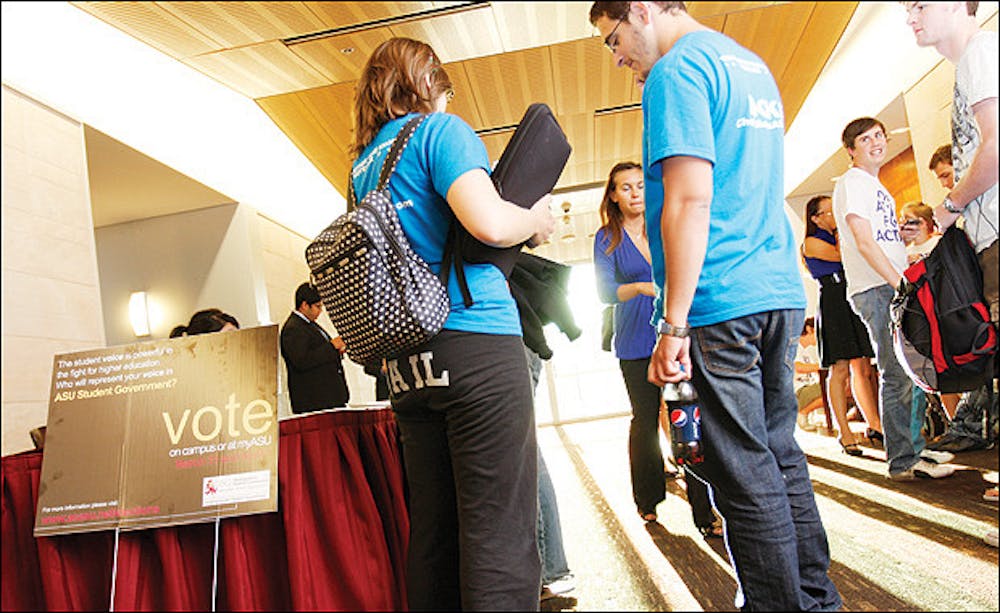Undergraduate Student Government presidential candidates stressed service and accountability for students in a debate on Tuesday night at the Tempe campus Memorial Union, but they differed on how to use the campuswide student fee.
The candidates outlined how they would reform appropriating money from the $25-per-semester fee, approved by the Arizona Board of Regents in spring 2008, with most promising more student involvement in the process.
“Any fee that students are going to have to pay should be student-controlled,” said Brendan O’Kelly, a history and political science sophomore. “We want students telling the administration where that money should go.”
If the administration wants to promote sustainability at ASU, O’Kelly said, it can pay for recycling bins around campus instead of making students pay for it.
With the funds under student control, O’Kelly said USG can work on reaching out to local and state organizations to build relationships with them and improve the resourcefulness of student government.
Advocacy was a popular topic for candidates, especially related to allocating the student fee.
History junior Christina Rocks said the fee is an important aspect that gives students financial independence and a voice in local affairs.
“You’re all busy as students,” Rocks said. “You don’t always have the time to advocate for yourself no matter how passionate you are.”
Services provided by the current fee are “not as wonderful as they could be,” she said, and should go toward improving conditions for campus clubs and organizations.
Among her proposals was a campus community center where clubs and organizations could have permanent offices.
History sophomore Sarah Atwill stressed finding out where students want the money to go.
“We really want to focus on having a student advisory board on student-fee allocation,” Atwill said.
She proposed a survey of Tempe campus students to find out how they want the funds to be distributed. The student advisory board would then be in charge of managing the money, she said.
This would bring transparency and accountability to student government, Atwill said.
A $25-per-semester student fee might be a burden to some students, she said, but it’s important to maintaining student services.
Medicinal chemistry and political science sophomore Raza Mushtaq also called for a student advisory board as a way to engage students, but only if students vote to keep the fee in the first place.
“We’ll be working to repeal this fee,” he said. “This first student fee has done nothing to help students.”
Mushtaq said the student government has a mindset that it knows best, but he wants to open up government and get more students involved in the process.
“We will come up with a budget, which will go to the students,” he said.
“The only way the students can actually take back the control … is by having this sort of referendum.”
Bioengineering junior James Alling was critical of how USG used the fee this year and promised to change the process if he is elected.
“I don’t want to fund a New York Times subscription when it’s free [online],” Alling said. “I don’t want to fund a $70,000 [public-relations] budget.”
Alling said he would not be able to give the money back to students because the fee was approved by the Arizona Board of Regents, but he would be able to return the value through student services.
Part of this plan includes giving student organizations money they request instead of forcing them to pay for activities and receive reimbursements later.
He said groups often make their members pay for activities that USG should pay for and they don’t receive their reimbursements for several weeks.
“I can give you your value back, and that’s my plan,” he said.
Darlene Menjivar, who ran for USG vice president of policy two years ago, was one of about 60 people attending the debate.
She said the style of the debate was very informative and allowed students to hear more than canned messages from the candidates.
“I love the responses that they came up with on the spot,” she said.
The open format, in which students asked several questions of the candidates, was great, she said, but she added that she would like to hear more from the vice presidential candidates.
“We do really need to hear from all the candidates,” she said.
Reach the reporter at adam.sneed@asu.edu.




